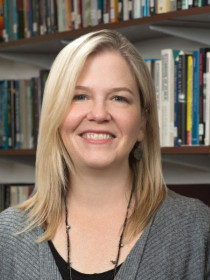
Clarissa Rile Hayward
Associate Professor of Political Science, Washington University in St. Louis
Chapter Member: Confluence SSN
Areas of Expertise:
About Clarissa
Hayward is a political theorist whose work centers on questions of power and freedom, racial justice, democracy, political aspects of education, and the American city. Her most recent book, How Americans Make Race, is about the “stickiness” of racial identity: about why people use racial identities even after rejecting the stories from which they were made. Her book draws on in-depth historical analyses of the development of racialized identities and spaces in the twentieth-century United States, and also on life-narratives collected from people who live in racialized urban and suburban spaces. It shows how racial identities are reproduced and explains why they are resilient in the face of challenge and critique.
Contributions
Why Conversations about Racial Beliefs are Not Enough
Key Findings Brief,
In the News
Quoted by in "Trump Victory Shows Racial Justice Movement Needs Better Storytellers," Social Work Helper, November 14, 2016.
Quoted by Joe Harris in "This City is Fining Black Residents for Having Weeds in Their Gardens," Huffington Post, November 12, 2015.
Quoted by Patrik Jonsson in "Just What is the 'Ferguson Effect'? It Depends on How You View Police.," Christian Science Monitor, June 12, 2015.
Opinion: "Why Does the U.S. Use Public Revenue to Support Private Home Ownership?," Clarissa Rile Hayward, The Washington Post, April 15, 2015.
Opinion: "What Now? Three Ways to Tackle Structural Injustice," Clarissa Rile Hayward (with ), St. Louis Post-Dispatch, November 26, 2014.
Interviewed in "Expert: ‘LA Riots with Rodney King is What Should be Expected to Happen in Ferguson’ ," CBS Local, November 3, 2014.
Interviewed in "St. Louis on Edge as Protests over Police Shootings Spread," Bloomberg News, October 13, 2014.
Interviewed in "How Professors in St. Louis are Teaching the Lessons of Ferguson’s Unrest," Chronicle of Higher Education, August 26, 2014.
Guest on The Scholars' Circle , August 24, 2014.
Quoted by Douglas Belkin and Matthew Dolan in "Ferguson's Experience Offers Lessons on Integration," Wall Street Journal , August 22, 2014.
Guest on Background Briefing with Ian Masters, August 20, 2014.
Quoted by Denver Nicks in "How Ferguson Went from Middle Class to Poor in a Generation," Time Magazine, August 18, 2014.
Quoted by Ralph Vartabedian in "Ferguson Unrest Reflects Decades of Racial Tension in St. Louis Area," Los Angeles Times, August 15, 2014.
Opinion: "When Talking about Race," Clarissa Rile Hayward, Philadelphia Inquirer, February 26, 2014.
Opinion: "It Takes More than a ‘National Conversation about Race’ to Change Racial Injustice," Clarissa Rile Hayward, Cleveland Plain Dealer, February 9, 2014.
Guest on Washington University's "Hold That Thought", November 6, 2012.
Publications
"How Americans Make Race: Stories, Institutions, Spaces " (Cambridge University Press, 2013).
Explores the “stickiness” of racial identity, asking why people use racial identities even after rejecting the stories from which they were made. Draws on in-depth historical analyses of the development of racialized identities and spaces in the twentieth-century United States and also on life-narratives collected from people who live in racialized urban and suburban spaces. It shows how racial identities are reproduced and explains why they are so “sticky.”
"Thick Injustice" in Justice and the American Metropolis, edited by Clarissa Rile Hayward and Todd Swanstrom (University of Minnesota Press, 2011), 1-29.
Argues that, after the Civil Rights Movement, the form that urban injustice takes changed qualitatively. Contemporary urban injustice is “thick,” in the sense of opaque and hence difficult to see and change, because it has deep historical roots and is entwined with both physical spaces and the structure of local governance in the U.S.
"What Can Political Freedom Mean in a Multicultural Democracy? On Deliberation, Difference, and Democratic Governance" Political Theory 39, no. 4 (2011): 468-497.
Discusses multiculturalism and deliberative democracy, and makes the case for focusing on the ideal of nondomination when assessing democratic institutions and practices.
"Urban Space and American Political Development: Identity, Interest, Action" in The City in American Political Development, edited by Richardson Dilworth (Routledge, 2009), 141-153.
Asks, “What’s special about urban space as a distinctive site of American political development?” Focuses on the materiality of physical spaces and places, the legal status place enjoy as property, and space’s relation to practices of democratic governance. Spatialized racial hierarchy in the contemporary metropolis shapes identities and political interests and delimits fields of possible political action.
"The Difference States Make: Democracy, Identity, and the American City" American Political Science Review 97, no. 4 (2003): 501-514.
Looks at the role the state has played and continues to play in constructing racial identity and racial hierarchy in the United States.
"De-facing Power " (Cambridge University Press, 2000).
Draws on in-depth ethnographies of two fourth grade classrooms – one in a poor, central city public school, the other in an affluent suburb – to show how power shapes human freedom. Power isn’t only or principally something the powerful have and use to control the powerless. Instead it takes the form of norms, laws, rules, and other social boundaries to action that constrain and enable all social action, including that of people who intuitively seem powerful.